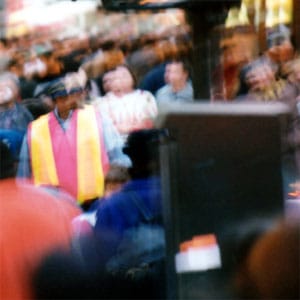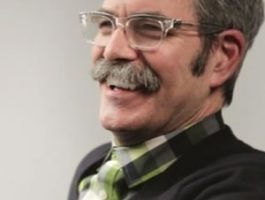
Living With Regret
Most of us will look back on our lives with a little bit of regret. On the broadcast today, Dr. Paul David Tripp, a Christian counselor and author of the book Lost in the Middle, talks about the emotional challenges of midlife and shares some sound advice for dealing with regret.
Show Notes
About the Host
About the Guest
-
Most of us will look back on our lives with a little bit of regret. On the broadcast today, Dr. Paul David Tripp, a Christian counselor and author of the book Lost in the Middle, talks about the emotional challenges of midlife and shares some sound advice for dealing with regret.
-
Dave and Ann Wilson
Dave and Ann Wilson are hosts of FamilyLife Today®, FamilyLife’s nationally-syndicated radio program. Dave and Ann have been married for more than 38 years and have spent the last 33 teaching and mentoring couples and parents across the country. They have been featured speakers at FamilyLife’s Weekend to Remember® marriage getaway since 1993 and have also hosted their own marriage conferences across the country. Cofounders of Kensington Church—a national, multicampus church that hosts more than 14,000 visitors every weekend—the Wilsons are the creative force behind DVD teaching series Rock Your Marriage and The Survival Guide To Parenting, as well as authors of the recently released book Vertical Marriage (Zondervan, 2019). Dave is a graduate of the International School of Theology, where he received a Master of Divinity degree. A Ball State University Hall of Fame quarterback, Dave served the Detroit Lions as chaplain for 33 years. Ann attended the University of Kentucky. She has been active alongside Dave in ministry as a speaker, writer, small-group leader, and mentor to countless wives of professional athletes. The Wilsons live in the Detroit area. They have three grown sons, CJ, Austin, and Cody, three daughters-in-law, and a growing number of grandchildren.
-

Paul David Tripp
Paul David Tripp is a pastor, author and conference speaker. He is the president of Paul Tripp Ministries and works to connect the transforming power of Jesus Christ to everyday life. This vision has led Paul to write 17 books on Christian living, produce 14 teaching series and travel aroun...more
Dr. Paul David Tripp talks about the emotional challenges of midlife and shares some sound advice for dealing with regret.
Paul: If I'm getting my identity and my ability to pull it off perfectly, I'm going to hit midlife, and I'm going to be in trouble. My security as a human being, my meaning and purpose, is not rooted in what I have done but what God has done for me.
Now, that doesn't mean that wrong things are not wrong, but it means I don't experience that loss of identity as I face my wrong, because my personal security is in the work of another on my behalf.
Bob: This is FamilyLife Today for Wednesday, October 11th. Our host is the president of FamilyLife, Dennis Rainey, and I'm Bob Lepine. Do you find yourself in the middle of life struggling with the fact that life seems to be speeding up while you're slowing down?
And welcome to FamilyLife Today, thanks for joining us.
Dennis: Could I tell you the beef that I've got with our guest on today's broadcast?
Bob: Have you got a problem?
Dennis: I have a problem. Dr. Paul David Tripp joins us again on FamilyLife Today. He is the author of "Lost in the Middle." Paul, I know you're really curious as to what beef I have against you.
Paul: I am.
Dennis: You should be. You wrote a book called "Lost in the Middle," all right, and you define the middle as 35 to 55. Now, I'm 58. So …
Bob: He's out of the middle.
Dennis: Where does that put the host of this broadcast? Is that called "near the end?"
Paul: I'm writing a book for you with very big letters and short chapters.
Dennis: I was reading that, and I was going, "Oh, my goodness."
Bob: You're going, "I'm not in the middle anymore."
Dennis: I'm not in the middle anymore.
Bob: And as you wrote that, is it possible for somebody at 31 to be dealing with midlife issues?
Paul: Absolutely, in fact, there was an article just in The Philadelphia Inquirer about men from 25 to 30 who have all of the ingredients of midlife struggles.
Bob: What's up with that? What's going on?
Paul: The issues, as much as they tend to hit in this age, are universal human issues. So I could hit disappointment anytime in my life, or regret, or the death of a dream.
Bob: Why am I here? What's my purpose? We can wrestle with that at any point in our existence, can't we?
Paul: That's right. In fact, you can argue that a person who has taken God's call and biblical morality seriously will be a person who will have greater regret than a person who didn't. That regret is actually a good thing. It's the result of holding onto God's goals and not being willing to settle for a human second-best.
Bob: You know what was playing in the back of my mind when you started talking about regrets – I was thinking about Frank Sinatra; thinking about that anthem to narcissism that he sang – "My Way," because the second verse there starts –
[Frank Sinatra sings "My Way"]
And I thought, now why would Frank sing that? Why would Paul Anka write that?
Paul: Well …
Dennis: "I didn't have many standards."
Bob: That's exactly what it is – too few regrets to mention because you really weren't hanging onto many lofty ideals, I guess, huh?
Paul: Well, that's exactly right.
Dennis: You and your wife were hit with this issue of regrets when your last child left home. I mean, you wrote about this in your book. How did it hit you?
Paul: We began to reminisce, you know, sort of walk through the video of your own life, and we really began to face that fact that we were not the parents in every situation that we wanted to be. And I remember this one situation where I had pirated away money for months – I was a poor pastor – to take my children to Hershey Park, and we had packed a cooler full of soda, and I have four children, so I had gotten four cans of each kind of soda except for one magic soda that I couldn't resist, and there were only two cans.
We got to the park. One of our children said, "Dad, can we have something to drink before we go in the park," and I said, "Sure," it didn't seem like a dangerous request. And they centered in on that – what was then – one can of that soda left because my older son was always the type of kid that if there's a crack in our parenting, he could drive an 18-wheeler through it, and he had had some of the soda.
And, I mean, it was, like, all of a sudden, there was global war broke out. I mean, our kids were pulling on one another's stuff and ice down one another's backs, hitting one another over the head with cans of soda. It was just craziness.
My day of familial amusement park bliss was over at that point, and so I jump in and said, "Do you want to fight? We don't have to pay all this money for you to fight. I can take you home, I'll put a cooler in the middle of the backyard, I'll put one can of soda in the middle, and you can fight forever."
Dennis: You're kind of red in the face right now.
Paul: That's right.
Dennis: Reliving it. You kind of said that with some authority.
Paul: I did, I did. I was out of control. Well, that's a hard moment to relive. That moment assaults everything I want to be as a father. It actually does something even more profound than that – it assaults what I thought I was as a father. Because we tend to look back, and we tend to have selective memories, and there are moments when your memory isn't so selective, when you see yourself as you actually are. It's hard to swallow.
Bob: When you think about regret, my mind always goes to the Apostle Paul, who you find at one point in one of his writings, he seems to be headed there. He starts looking back with some level of regret over the man he was before he knew Christ, and he says, "You know, frankly, it's waste. It's" – he uses a graphic term. He says, "It's dung when I look at my life," and yet it seems his strategy was forgetting what lies behind and pressing on. Is that what we're supposed to do with regret?
Paul: It is not just about the fact that I affirm that I was a flawed father. I mean, you can say, "Well, duh." It is that, in the face of what my belief that I wasn't is doing for me. If I'm getting my identity and my own righteousness in my ability to pull it off perfectly, I'm going to hit midlife, and I'm going to be in trouble because if I don't recognize it, my kids will recognize it.
Another example I've had – many parents go through this – is when the kids begin to tell the silly stories, the things you did as a parent. And they get bittersweet for you, because they're actually joking about things that are areas of weakness, and it's hard to hear.
Well, if your identity has been in your own righteousness, then you're devastated when you begin to face the fact that I was not the person that I was. Now, what Paul actually does is counters regret, that kind of regret, with his identity in Christ and saying, "My security as a human being, my meaning and purpose, is not rooted in what I have done, but what God has done for me." Now, that doesn't mean that wrong things are not wrong, but it means I don't experience that loss of identity as I face my wrong, because my personal security is in the work of another on my behalf.
Bob: Not all of our regret is wrapped up in parenting, although for those of us who are parents, we sure can look there, and it's kind of like a visible reminder of your regret.
But I've had the experience of – I'll be watching television and here's some guy on TV, and he's influential, and he's making pretty good money, and he's talented, and then I find out he's 32, and I go, "Young kid, young stupid punk kid," you know, who has got all of that going for him. It used to be, you'd look at people you admire, and they were all older than you. Now you're looking at people you admire, and they're younger than you, and you think, "That shouldn't be." I'm admiring younger people? That doesn't make – you know what I mean?
Paul: Let me talk about some other places where regret can root. One is use of time. You'll hit a place in your life – you were just talking about that – where you see somebody who is 35, and they've accomplished so much, and you think "What did I do with my time?" Or maybe it's money regret. You think, "I could have done so much more with the resources that God gave me."
Another kind of regret that I think is the most universal – it's what I would call "choice point" regret. It's those key decision moments in my life. That's where you think, "If only I had decided the other way," "If only we had moved," "If only I hadn't taken that job," "If only we hadn't left that church," if only, if only, if only. Those key choice points in your life.
Bob: So, again, if you're looking at biblical strategies for dealing with regret, we're aware of it, we know it's there. One of the things you said is we really have to focus on understanding our identity, who we are in Christ apart from the circumstances of life. How else do we deal with this?
Paul: Well, I think there some things that are very clear in Scripture. First, God welcomes us to embrace the freedom of confession. One thing nice about biblical faith is I don't have to live in the darkness. I can come out of hiding, and I can be exactly who I am before God and be unafraid because Christ has paid the price for everything in my life.
The second thing is …
Dennis: I want to stop you there, because I think you're making an important point, and I don't want to run past it.
Paul: Okay.
Dennis: What you're saying is that regret can point us to something greater, and it can be like a compass. You know, when you hold a compass, it points you to where true North really is, and it points you to a place that's significant. And so if you're experiencing regret, it means you have an opportunity to confess your failures and admit where you're disappointed and say, "God, I'm sorry. I failed here. I confess. I agree with you about what you say about this sin," or this failure of mine and its impact.
Paul: One of the things that gets me up in the morning – this is absolutely true – is the knowledge that I don't have to play con games with myself – that I can look at my real story, I can look at my weakness, and I can stand in front of God unafraid. I don't have to play games. That is precious to me. I can be honest and unafraid.
Bob: And it's interesting, because confession seems almost paradoxical. It's almost like the way to deal with regret is to be honest about it. It seems more like it would be a more effective strategy to gloss it over, cover it up, paint it, somehow …
Dennis: But, see, that's the stuff of midlife crisis.
Bob: Right. I know what you're saying.
Dennis: You've got a fresh paint job on an old, rusty issue, and try to pawn it off. But I think that's what the Apostle John was talking about in the first chapter of 1 John. He says, "If we say we have no sin," what did he say there – "we lie, and the truth is not in us."
Paul: Right.
Dennis: But then he goes on in verse 9, and he says, "If we confess our sins, he is faithful and righteous to forgive us our sins and to cleanse us from all unrighteousness." So he is pointing us to the fact that God is a God of grace, as you've said, Paul, and a God of forgiveness, that if we confess our sins, if we agree with what God says about our sins and about our regret, God is ready to meet us there, and he's ready to take us from that point forward.
Paul: What allows me to celebrate the freedom of confession is the promise of forgiveness; that there is …
Bob: It's the cross, isn't it? It's the cross.
Paul: That's exactly right. There is nothing that I could ever say to God that would be shocking or surprising to Him. There is nothing that I could ever confess that would be outside of the provision of His grace. And so I not only celebrate the freedom of confession, but I embrace God's forgiveness.
There's a third thing here that I think is very important, is that I rest in God's sovereignty. There is somebody who is writing my story, and it's not me, and that's okay. And one of the pieces of God's sovereignty that's very precious in midlife is His timing. God makes me aware of things as I am able to be aware of them.
There's a precious moment at the end of Christ's life where He's talking with his disciples. He says a very sweet thing, he says, "There's many more things that I could say to you, but you're not able to bear them. I'll send another helper, and he'll teach you more." That's how God works with us. He knows exactly what we're able to bear, He knows exactly when "this is a teaching moment," to give the kind of insight that you now have.
Dennis: I was so glad when I saw this point in your list of how you deal with regret, and I would never have articulated it like you did. I thought you did a beautiful job in your book, but I thought as I look back at how I have passed through midlife, Bob, and as I've …
Bob: … moved past the middle …
Dennis: … moved past the middle – as I have moved past it, in all seriousness, what's enabled me to process what I have done wrong and done right? Well, is that there is someone who is bigger than me who is in charge. God is sovereign and you know what? I'm not trying to whitewash my mistakes, I'm not trying to sweep them under the rug but you know what? Since the beginning of time, this book, the Bible, is about how God used flawed people to accomplish his purposes.
Paul: Amen.
Dennis: And you know what? I think a single mom can rest in that. She may have some regrets about some things, looking backwards, but you know what? She can go, "Yeah, I made some mistakes, and I confessed those, and I rest in God's forgiveness," but it's also true God is sovereign. We can depend upon Him accomplishing His purposes on this planet.
Bob: As I read that, I thought of Ecclesiastes, chapter 3, where it says "He sat eternity in our hearts," that we do have a longing for that perfection. But it also says that he makes all things beautiful in His time. And later on, the Prophet Isaiah says that God takes ashes and makes them into something beautiful. So while we look back with some regret, there is great peace in knowing that a sovereign God is watching over and ordaining what's going on and working it out for His purposes and making beauty of something that we look back on with some level of regret.
Paul: That's right.
Dennis: It's not some theological copout.
Bob: No.
Paul: It's very practical.
Dennis: It really is practical, because if your God's not in charge, then guess who ultimately is responsible? Me. And, at that point, what am I going to do with my regrets.
Bob: Now we've got some despair to deal with, yes.
Dennis: I really do. Continue on with your list.
Paul: You want to clarify identity. This is a great moment to have a deeper understanding of who you actually are. Paul says it this way in Galatians 2:20 – "It's no longer I who lives but Christ lives in me, and the life I live I live by faith, and the Son of God who loved me and gave Himself for me." God's gift of salvation is not just about eternity. Praise God, it's about that, but it's about a whole new gift of identity. And that identity is a change in my potential as a human being, because I'm not by myself. God has literally unzipped me and got inside of me by his spirit, and I'm not just an average Joe bumping around the street hoping I can make it. I have resources of wisdom and power and strength and grace that are beyond the ability of this little brain to wrap itself around. That's not just some mystical thing out there. It is actually now my identity as a child of God. It's who I am.
Dennis: Right.
Paul: And so I can look at my human failure and say, "But I don't define my identity just by my track record. And I don't define my identity just by the size of what I'm facing. I must define my identity in the midst of those things that are real by who I am in Christ."
Dennis: I have a friend, Crawford Loritts, who refers to this as your "spiritual address."
Paul: That's a great term.
Dennis: We've got a spiritual address because of the cross, and it's a permanent one. In fact, that really kind of hints at the last two – the last two ways to handle regret, which I really like. Share those with the listeners.
Paul: Well, the next is plant a new harvest. You're not dead, and …
Dennis: … the game's not over.
Paul: No, and this is an opportunity now, with greater wisdom, greater understanding, clearer personal insight than I've ever had before, to set out and live life in new ways in God's way.
I'm going to use my time in a better way, I’m going to use my money in a better way, I'm going to look for those "choice point" moments and make better godly decisions. I'm going to continue to be a parent, even though I have adult children, and be excited about that. I'm involved with the church. They need the wisdom of people who have some street experience. So instead of just mourning old plants, I'm going to plant a new harvest.
Dennis: Barbara and I have a maple tree right outside our bedroom window, and we planted it about a decade ago, and I don't know what it tapped into, there must be an underground water supply, but this tree has just gone berserk, and it is magnificent.
Come about October 25th, it turns a brilliant, beautiful yellow and sometimes an orange that's – it's like it's electric, it's like it's plugged into electricity and, many times, I have walked out underneath that tree, and I've said, "Why didn't I plant more of those trees?"
And I wonder if there are people listening right now, looking back over their lives going, "Why didn't I make more right choices when it came to being obedient to what God expected of my life?"
Paul: And I would even change your metaphor a little bit. I think there are people out there who are trying to glue fallen leaves on old trees, and it's not working. And God has welcomed them to plant new seeds and watch new trees grow and blossom and fruit.
Dennis: It's never too late to plant those trees.
Bob: So you're saying when you deal with regret, don't necessarily go try to repair the past, don't try to fix everything that God messed up, but start a new field?
Paul: There are things that you can repair and in ways when you do that, you are planting new seeds, new seeds of relationship. But there are things that are just – they're over. I can't go back to that job, I can't relive that experience again, but the Bible is a book of fresh starts. What a sweet thing that is, and it's a chronicle of fresh starts over and over again. That's God's grace.
Dennis: And that's what the Gospel is all about. It is the Gospel of second chances. If you failed miserably or even if you've had some measure of God's favor upon your life, the key is walk by faith and keep on planting for the eternal harvest. That's what matters.
Bob: I wish I could have gotten a copy of your book to Frank Sinatra so you know when he was dealing with his regrets, maybe he could have dealt with them a little more honestly.
Dennis: Some of our listeners, Bob, have no idea who Frank Sinatra …
Bob: Oh, they've got to know the Chairman of the Board, you know? We're talking the Chairman – cue up the song here, Keith.
[Frank Sinatra sings "My Way"]
Now, that's what I'm talking about, you know? "Regrets, I've had a few but then again too few to mention." I think if he'd read the book maybe he'd have gone, "Okay, I get it." The book we're talking about, of course, is the one that Paul David Tripp has written, which is called "Lost in the Middle," which we have in our FamilyLife Resource Center, and no matter where you are in life, approaching the middle years, in them, or even if they have passed you, and you're looking back on them, I think this is a book that helps us understand how to deal with some of the issues that are more likely to emerge in those middle years than in other times of our lives but, frankly, there are times in life, even in the younger years, when some of these issues start to show up, when there are issues of regret and the other things we've talked about this week.
Go to our website, FamilyLife.com. You will find, in the middle of the home page, a red button that says "Go," and if you click that button it will take you to a site where there is information about Paul David Tripp's book, "Lost in the Middle."
Other resources that are available on the same subject – John Piper's wonderful book, "Don't Waste Your Life," is available in our FamilyLife Resource Center, and that's a book to help re-orient your thinking about any stage of life in which you find yourself. We have it in our FamilyLife Resource Center as well and, in fact, any of our listeners who would like to get both books, we will send along at no additional cost the CD audio of our conversation with Paul David Tripp this week so you can listen to it again or pass it along to someone else who might benefit from listening to it.
Again, our website is FamilyLife.com. There's a red button that says "Go." If you click on that button, you can order these resources from us online at FamilyLife.com or you can call 1-800-358-6329. That's 1-800-F-as-in-family, L-as-in-life, and then the word TODAY, and we'll make arrangements to get these resources sent out to you.
You know, I think one of the regrets that a lot of people wind up having at different places in their life is the regret that there was not a mentor available who could help them navigate some of the challenges that life throws at us, and I was thinking about that when I thought about a message that your wife Barbara gave not long ago to a group of women on what a wife can do to help her husband be the man God wants him to be. And I heard afterward from a number of these women just how helpful that message was. It was a mentoring message, and we have the message on CD, and this month we are making it available to any of our listeners who can help the ministry of FamilyLife Today with a donation of any amount. We are listener-supported, so those donations are vital for our ongoing ministry.
If you can go to our website at FamilyLife.com and make a donation there, when you fill out the donation form, and you come to the keycode box, just type in the two letters, "CD," and we'll know to send this CD from Barbara Rainey to you. Or call 1-800-358-6329, that's 1-800-F-as-in-family, L-as-in-life, and then the word TODAY and, again, ask for the CD from Barbara Rainey, and we'll make sure to send it to you. It's our way of saying thanks for your ongoing support of the ministry of FamilyLife Today. We appreciate hearing from you.
Well, tomorrow we're going to talk about what happens when dreams die in the middle years. How do you deal with the fact that life isn't going to be what you dreamed it might be? We'll talk about that tomorrow with Paul David Tripp. I hope you can be back with us for that.
I want to thank our engineer today, Keith Lynch, and our entire broadcast production team. On behalf of our host, Dennis Rainey, I'm Bob Lepine. We'll see you next time for another edition of FamilyLife Today.
FamilyLife Today is a production of FamilyLife of Little Rock, Arkansas, a ministry of Campus Crusade for Christ.
We are so happy to provide these transcripts to you. However, there is a cost to transcribe, create, and produce them for our website. If you’ve benefited from the broadcast transcripts, would you consider donating today to help defray the costs?
Copyright © FamilyLife. All rights reserved.




